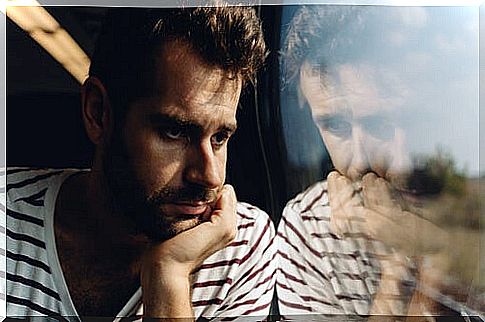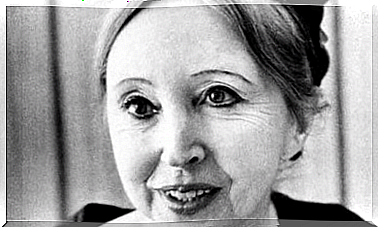Existential Emptiness: The Feeling That Life Has No Meaning

Life has no meaning. That is the main belief of those who experience the heartbreaking sensation of neglect to live, the weight of injustices and a kind of disconnection from everything that surrounds them.
They are usually thoughtful people who inquire into matters of great importance, such as death or lack of freedom, and who cannot shake off a deep existential void that engulfs them ever stronger. Void to which society contributes with its prevailing messages related to individual values and immediate satisfaction.
Although they are also those who navigate in the search for pleasure with the sole purpose of anesthetizing their suffering. The difference is that the latter do not notice the emptiness they experience.
For both, there are no answers to why to live. Nothing fills them, nothing satisfies them and, precisely, that ends up trapping them in a psychological state of suffering. In most cases, this situation leads to deep depression or self-destructive behaviors.
The existential emptiness is the spiral of nonsense and the consequence of recognizing oneself as someone who looks at the world with a different perspective due to the incongruities detected or as someone who has been carried away by the achievement of pleasure to avoid suffering. A very widespread phenomenon today. Let’s go deeper.

In the depths of the abyss
The development of a sense of life can be frustrated when goals and objectives are not fully realized or fulfilled; when the clash between expectations and reality is so strong that only disappointment makes an appearance, or when crisis situations threaten the feeling of security and certainty and there are no adequate tools to deal with them.
All this leads to a deep state of existential frustration that empties the person from the inside and that, at times, leads them to a painful abyss. It is as if inside they house a dense desert, the one in which absurdity dominates existence and almost all capacity to connect and feel others is lost.
For the psychologist Benjamin Wolan, this state was called existential neurosis and he defined it as “the failure to find meaning in life, the feeling that one has no reason to live, to fight, to hope… that one he is incapable of finding a goal or a guideline in life, the feeling that, although individuals try very hard at their work, they do not really have any aspirations ”.
Some authors, such as the psychotherapist Tony Anatrella, point out the constant search to satisfy the ego as the cause of this loss of meaning, since they are selfish actions that impede the capacity for personal transcendence.
And in relation to this, other authors affirm that the loss of meaning is associated with the disappearance of the other, the supremacy of individualistic values and the obtaining of pleasure as a – erroneous – mechanism to be happy. In this way, the person clings to their individual desires, and the meaning of social references, such as coexistence, solidarity or mutual respect among others, is diluted.
Thus, when reality is confused and the means to achieve happiness become ends in themselves, one runs the risk of falling into a void. Short-term pleasurable emotions, such as enjoyment or happiness, provide pleasure, but not self-realization and, like all pleasure, carry the danger of creating bondage or addiction.
Somehow, man has a need to do something with his life, which is not only good, but also made by him. Therefore, the meaning of life is related to the destination you want and need; because through this desire, man tries to offer freedom to his own development, since when he lives fully, it is when his freedom transcends the limits of his immanence and understands that the meaning of his life is not only reduced to something material and finite, but transcends, goes beyond.
The problem is when this does not happen as expected, when circumstances do not meet the expectations of your life project and nonsense leads you to the abyss of existential emptiness.

The noetic dimension of man
According to the Swiss psychiatrist Viktor Frankl, man has mainly three dimensions:
- Somatic dimension. It is made up of the bodily sphere and the biological sphere.
- Psychic dimension. It is about psychodynamic reality, that is, the psychological and emotional universe.
- Noetic dimension or spiritual dimension. It encompasses the phenomenological areas of the soul. Therefore, this dimension transcends the other two. In addition, thanks to it, the human being can integrate the harmful experiences of existence and develop a healthy life on a psychological level.
Thus, when the person experiences a deep state of boredom, reluctance and is lost in the labyrinth of their existence, they have conflicts in their spiritual dimension. He is not able to integrate his wounds, he may not even identify them; but neither to find a reason for his existence, so that he drowns in suffering and experiences a lack of meaning, coherence and purpose or what is the same: an existential void.
Frankl claims that this void is the root of many mental disorders. That is, the break in the noetic or spiritual dimension, that feeling that existence has no meaning, is expressed in the psychological dimension through three main groups of symptoms:
- Depressive symptoms
- Aggressive symptoms with or without uncontrolled impulses.
- Addictions
In this way, people trapped in the existential void are as if they cover their gaze and their feelings with an unconscious veil, the one that prevents them from finding the meaning of their life and that leads them to chronic dissatisfaction and despair. So what do you do to find that meaning?
In search of meaning
According to the Swiss psychologist Carl Jung, man needs to find meaning in order to continue his path in the world. Therefore, without that meaning, he is lost in nowhere, in no man’s land, wandering in the labyrinth of existence.
Frankl emphasizes that the path to meaning is mediated by values and that social consciousness is the instrument that reveals it. Now, despite the values arising from personal intimacy, they end up culminating in universal values, which coincide with cultural, religious or philosophical systems.
Therefore, the connection with the other is important so as not to lose the meaning of life, as is the maintenance of affective bonds, as long as all the responsibility of being happy is not placed on them. In a way, a meaningful life is a life rooted in the social.
The French sociologist and philosopher Durkheim reflects very well the problem of social uprooting and the consequences that it entails: ” [when the individual] individualizes beyond a certain point, if he separates himself too radically from other beings, men or things, he finds cut off from the very sources from which it should normally feed, it no longer has anything to apply to. By making emptiness around her, she has emptied herself and has nothing left to ponder other than her own misery. It no longer has as its object of meditation anything other than the nothingness that is in it and the sadness that is its consequence ”.

Now, it is not about looking for guilty or saviors, but rather about adopting a thoughtful and responsible attitude that allows us to inquire within ourselves, find a purpose and get out of that existential void. Because it is true that there is no more complicated question than what is the meaning of life for us.
It is convenient to affirm that there are multiple ways of defining the meaning of life, as many as people and, even, each of us can change our vital purpose throughout our existence. Therefore, what matters, as Viktor Frankl stated, is not the meaning of life in general, but what meaning we give it at any given moment.
In addition, Frankl affirms that we should not inquire into the meaning of life, but understand that it is we who are being asked. In other words, we can respond to life by responding to our own life. This means that responsibility is the inner essence of our existence.
Because although we have invested time, energy, effort and heart, life, sometimes, is not fair. And despite the fact that at the moment collapsing is totally understandable, we have two options: accept that we cannot change what happened, that there is nothing to do and we are victims of circumstances, or accept that we cannot actually change what has happened to us. It has happened, but our attitude towards it has.
Therefore, we are responsible for our actions, for our emotions and thoughts, for our decisions. And therefore, we have the option to decide why, to what or to whom we hold ourselves responsible.
Therefore, the meaning of life is always changed, it never ceases. Every day and every moment we have the opportunity to make decisions that will determine whether we are subject to our own circumstances or whether we act with dignity, listening to our true selves responsibly and free from the traps of pleasure and immediate satisfaction.









